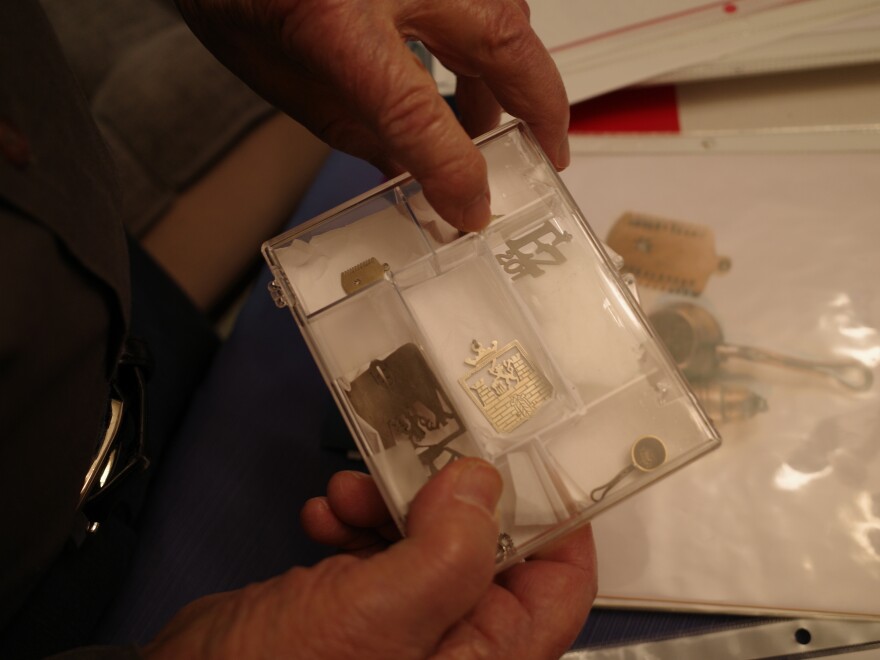Vladimir Munk remembers the day he walked free from Blechhammer, a sub-camp of Auschwitz in eastern Germany.
"I was happy," Munk says. He was sick and starving, but he had survived.
The Soviet Army liberated Auschwitz on Jan. 27, 1945. The concentration camp in Poland is where more than a million people, mostly Jews, were murdered during the Holocaust. This Monday, on the 75th anniversary of the liberation, Munk is traveling back to Auschwitz for the first time since he was imprisoned there.
Munk's parents were killed in Auschwitz, as were most of his family members. "So, for me, it's like going to the family cemetery," Munk says.
The decision to go back, though, wasn't an easy one to make. When he walked free from Blechhammer, Munk decided not to let the experience define him. He says he's known survivors who never recovered from the Holocaust.
"They are a survivor, but they never got over it," Munk says. "Yes, I'm a survivor, but I've tried to live a normal life."
Munk was born in Pardubice, Czechoslovakia, in 1925, and was a teenager when Nazi Germany invaded the country. A few years into the occupation, Munk's family was forced onto a train and sent to a concentration camp called Terezin.
After living in a Nazi-occupied city, Munk says going to Terezin was an adventure.
"I was 18 years old and living in a normal city like Pardubice, for Jews and especially young Jews, it was really like being in a concentration camp because you were not permitted to attend theatres, movies, sporting events, nothing."
Terezin was not an extermination camp, though space was tight and food was scarce. More than 33,000 people died at Terezin during the Holocaust.
At the time, though, most Jews and much of the world didn't know what was coming, that the Nazis were building gas chambers capable of killing thousands of people at a time.
At Terezin, Munk had a job, he was able to see his mother and father, and he got a girlfriend. Then, after two years in Terezin, Munk and his father were sent to Auschwitz-Birkenau.
Munk knew the concentration camp had a bad reputation among prisoners, but hadn't heard about the gas chambers. When they arrived, Nazi soldiers ordered Munk one way and his father the other.
He later asked a neighbor in Auschwitz if he knew what had happened to his father. Munk says the man pointed to the smoke in the sky and told him his father had gone up the chimney.
"So that was it," says Munk. "You never died in Auschwitz. You went up the chimney."

His mother met the same fate, just months before the liberation of Auschwitz in 1945. Munk spent his first months free begging for food in Poland. Eventually he made his way back to his hometown in Czechoslovakia.
By the end of 1945 Munk had re-enrolled in school. He went on to earn a master's degree and then a PhD in microbiology and biochemistry. In 1949 Munk married Kitty, the girlfriend he had when the two were prisoners in Terezin.
Munk and his wife left Czechoslovakia after the Soviets invaded in 1968. They moved to Plattsburgh, N.Y., where Munk took a job teaching microbiology at the local university, SUNY Plattsburgh.
Even when they had kids, Munk says they didn't talk to them about the Holocaust until they were teenagers. He says he didn't want the experience to define their family.
Munk is retired now and his wife of 66 years, Kitty, died in 2015. After a living a full life, Munk has starting thinking more about his time in the Nazi concentration camps and about the family he lost at Auschwitz.
"You are thinking of all your relatives from time to time,"Munk says. "I try not to think, but you think about it."
Munk is traveling back to Poland this weekend. While he's had time to pack and prepare for the experience, when he really pictures himself back at Auschwitz for the first time, Munk closes his eyes and shudders at the thought.
Copyright 2021 NCPR. To see more, visit NCPR. 9(MDAxNzg0MDExMDEyMTYyMjc1MDE3NGVmMw004))


